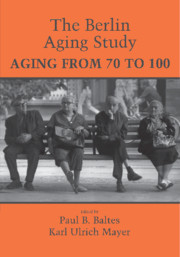Book contents
- Frontmatter
- Contents
- Acknowledgments
- Introduction
- Part A Theoretical Orientations and Methods
- Part B Major Results from the Four Research Units
- Part C Interdisciplinary Findings
- 9 Men and Women in the Berlin Aging Study
- 10 Social Relationships in Old Age
- 11 Self, Personality, and Life Regulation: Facets of Psychological Resilience in Old Age
- 12 Limits and Potentials of Intellectual Functioning in Old Age
- 13 Sensory Systems in Old Age
- 14 Everyday Competence in Old and Very Old Age: Theoretical Considerations and Empirical Findings
- 15 On the Significance of Morbidity and Disability in Old Age
- 16 The Utilization of Medical and Nursing Care in Old Age
- 17 Sources of Well-Being in Very Old Age
- Part D Overview and Outlook
- Notes on Contributors
- Abbreviations
- Author Index
- Subject Index
12 - Limits and Potentials of Intellectual Functioning in Old Age
Published online by Cambridge University Press: 06 December 2010
- Frontmatter
- Contents
- Acknowledgments
- Introduction
- Part A Theoretical Orientations and Methods
- Part B Major Results from the Four Research Units
- Part C Interdisciplinary Findings
- 9 Men and Women in the Berlin Aging Study
- 10 Social Relationships in Old Age
- 11 Self, Personality, and Life Regulation: Facets of Psychological Resilience in Old Age
- 12 Limits and Potentials of Intellectual Functioning in Old Age
- 13 Sensory Systems in Old Age
- 14 Everyday Competence in Old and Very Old Age: Theoretical Considerations and Empirical Findings
- 15 On the Significance of Morbidity and Disability in Old Age
- 16 The Utilization of Medical and Nursing Care in Old Age
- 17 Sources of Well-Being in Very Old Age
- Part D Overview and Outlook
- Notes on Contributors
- Abbreviations
- Author Index
- Subject Index
Summary
In the first-occasion Intensive Protocol of the Berlin Aging Study (N = 516), a psychometric battery of 14 cognitive tests was used to assess individual differences in five intellectual abilities: reasoning, memory, and perceptual speed from the mechanic (broad fluid) domain, and knowledge and fluency from the pragmatic (broad crystallized) domain. In addition, the Enhanced Cued Recall (ECR) test was administered in the context of a separate neuropsychological examination to identify dementia-specific cognitive impairments in cue utilization and learning potential. The overall pattern of results points to sizable and highly intercorrelated age-based losses in various aspects of presumably brain-related functioning, including sensory functions such as vision and hearing. Intellectual abilities had negative linear relations to age, with more pronounced age-based reductions in mechanic than pragmatic abilities. Ability intercorrelations formed a highly positive manifold, and did not follow the mechanic-pragmatic distinction. Gender differences were small in size, and did not interact with age. Indicators of sensory and sensorimotor functioning were strongly related to intellectual functioning, accounting for 59% of the total reliable variance in general intelligence. Even for knowledge, sociobiographical indicators were less closely linked to intellectual functioning than the sensory-sensorimotor variables, and accounted for 24% of the variance in general intelligence. With respect to potentials, results obtained with the ECR test demonstrate that the ability to learn from experience is preserved in normal cognitive aging across the entire age range studied, but severely impaired in individuals with dementia.
Information
- Type
- Chapter
- Information
- The Berlin Aging StudyAging from 70 to 100, pp. 329 - 359Publisher: Cambridge University PressPrint publication year: 1998
Accessibility standard: Unknown
Why this information is here
This section outlines the accessibility features of this content - including support for screen readers, full keyboard navigation and high-contrast display options. This may not be relevant for you.Accessibility Information
- 5
- Cited by
